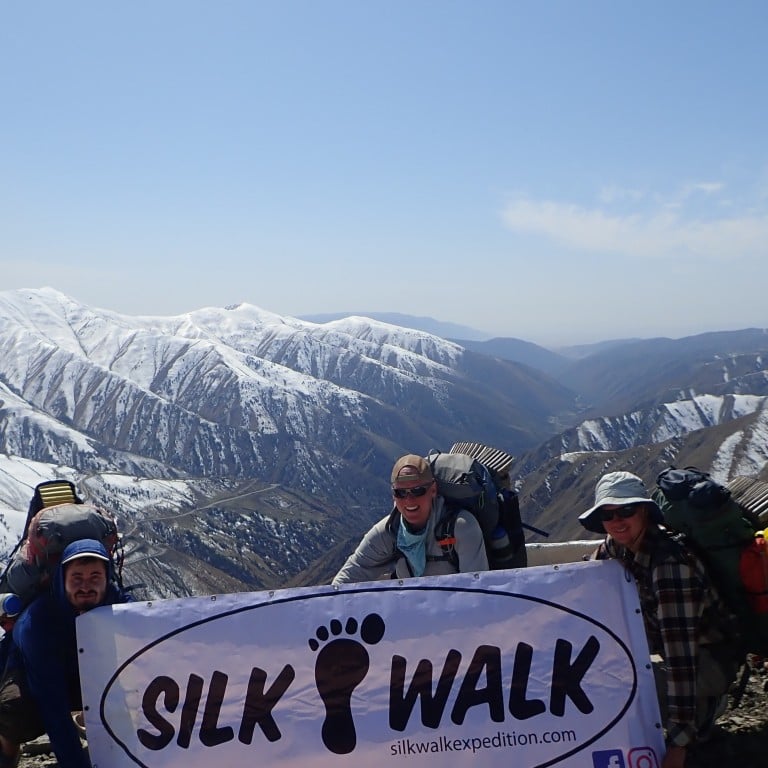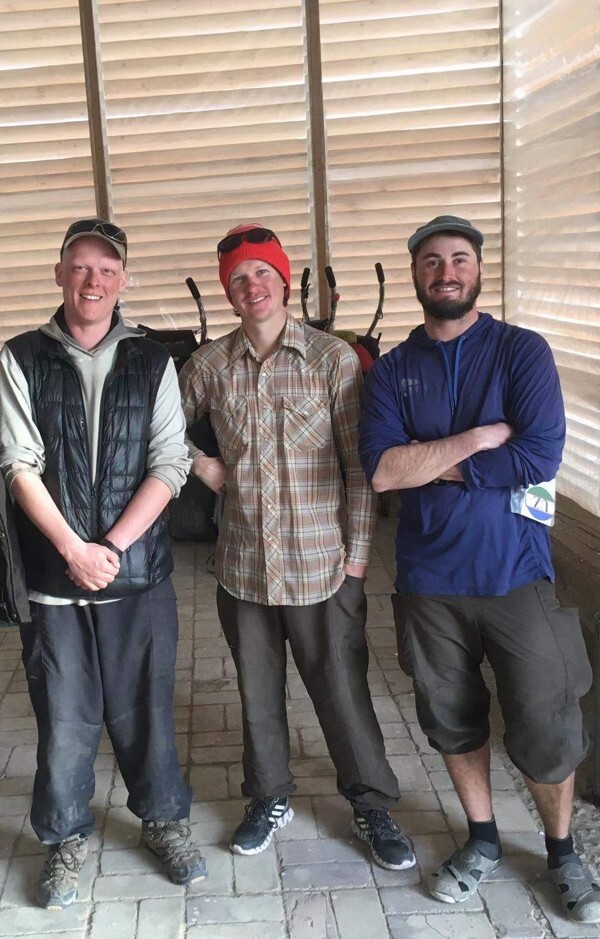
Walking the Silk Road, Americans met by ‘aggressive hospitality’ and scary heat
- Paul Ronan, Patrick Exe and Timb Mannuzza spend two years walking from Xian to the Caspian Sea and are now on hold because of Covid-19
- The three Americans are welcomed by strangers wherever they go and have difficulty refusing hospitality – and watermelons
Three Americans have spent two years walking from Xian in China to the Caspian Sea following the ancient Silk Road. With the “finish line in sight” in Turkey, they couldn’t outrun Covid-19.
Paul Ronan and fellow China-based Americans Patrick Exe and Timb Mannuzza have had to pause the trek and return home until the pandemic eases and travel restrictions are lifted.
The trio are Outward Bound instructors and had done short expeditions, but when they found out their bosses had ventured to the North or South poles, they decided they better tick one off, too.
They first considered walking across Mongolia, but settled on the Silk Road, the trade route that linked Asia to Europe for centuries. They have covered 7,139km and have about 2,000km to go. As they trudged along pulling carts with their supplies, the trio have been overwhelmed by welcomes, no matter the country or province.
“One of my biggest takeaways, which I did not expect, was a sense of hospitality, that I did not even know existed,” said Ronan. “We called it aggressive hospitality.”
Strangers would ask them to stay, sometimes for a week, but they had to politely refuse as they had kilometres to walk and schedules to meet.
“We went in with that kind of expedition mentality. You have all your stuff, you have a rhythm and you do the same thing every day. You don’t make decisions, you do what you have to.
Coffee-table history of Silk Road in bite-sized pieces
“But some of the interactions were some of the most memorable and powerful. It’s more powerful in some ways to learn about someone’s life than when you are on top of a mountain or in a canyon.”
Being polite and focusing on the task of putting one foot after the other was a fine line.
“The first time someone comes running down the road to give you an apple, you think ‘wow, this is amazing’. But then when it happens again and again, you don’t want to eat apples, let alone carry more apples. You end up turning them down. Then you get to Xinjiang and they start giving you watermelons. Where am I supposed to put a watermelon?” Ronan asked.

“You want to make a good impression, even if you are having a bad day. You cannot be a jerk to someone.”
The uplifting but sometimes tiring etiquette is just one of the challenges they faced. Given how long the trio walked, they passed through all the seasons and had to carry clothes for the hot summers and cold winters.
“Cold, that happens slowly over time before it’s an issue. Cold is just really uncomfortable over time, but heat, there is no escape,” Ronan said.
In the Gobi, the carts were heavy because they were loaded with water. hey rigged up tarps between the carts for shade.
“The heat was the scariest,” Ronan said. “You’d walk and walk, then all of a sudden you’d be near to passing out and there was not a lot you could do besides wait to cool down.”
Delays meant they reached Kyrgyzstan later than they expected. The country is high, with huge mountains and passes. Winter was settling in and they decided to go home and restart the journey in spring.
Runner of past, present and future – Wong’s trans-Japan epic
“We had all done winter trips, but they were a week. In December, we just realised we had three more months of this,” Ronan said.
He still smarts at the decision.
“We wanted to do it continuously. It’s bittersweet. To be honest, there was a lot of regret. We were late due to ourselves.”
When they took up the journey again in 2020, there was another delay no one would have envisioned. Passing places with Wi-fi every week or so, they first learned of a virus in China. Next time they accessed Wi-fi, the coronavirus had made it to Italy. Then Covid-19 had spread to the whole world.
Their next destination revoked their visas, with Georgia shutting its border, along with Turkey. They did not want to wait around in Kazakhstan for the pandemic to blow over so will return to the shores of the Caspian Sea as soon as they can to complete the final leg to Istanbul.
“When there’s an international crisis, there’s nothing you can do,” Ronan said. “We may have three or four months left, we could see the finish line. But we had to make the decision quickly and it was an easy decision.”

